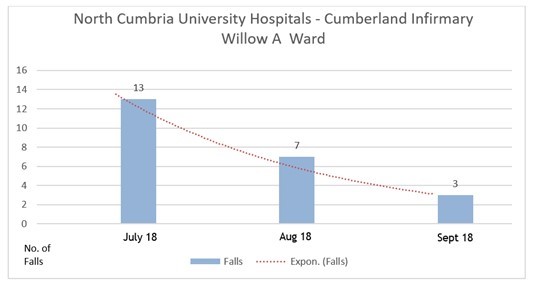Who Cares about Falls? RITA Does!
A harmed fall can cost the Trust upwards of £70K. However, I am strongly of the view that any fall causes harm! So, this was one of the many areas where we decided to place significant focus and how we can improve the patient experience for the elderly and particularly those living with dementia and reduce the risk to meet with our over-riding strategic aim of high quality, safe and effective service for our patients.
Having conducted a great deal of research into many different alternatives, we decided to try ‘RITA’. This has been our additional resource and it has been powerful in stimulating the elderly patients on Elm C Ward. We noticed the falls rate on our other ward, Willow A had increased and as Falls Prevention Lead, quickly realised this was something we needed to address. We brought ‘RITA’ onto Willow A Ward, the change was significant.

- Other significant impacts have been that our Delirium Outreach Team have been able to work with patients that previously they have been unable to work with because of their need to be isolated. This arrival of ‘RITA’ has been able to change the mood and stimulate our patients so that they are able to engage in more meaningful activities.
- Relatives have commented on the mood of their family member and how they have been able to engage in discussion with them and talk about the different activities they have been involved in. It was less of struggle to find something to talk about.
- Staff morale has also improved.
- Staff found it very easy to use in a short period of time, so was very efficient
- Patients were much more settled whilst being entertained, so relatively less restless.
- Great tool for creating good communication with patients.
Mairi Clark -Falls Prevention Lead
Member of the National Falls Practitioner Working Group
North Cumbria University Hospitals NHS Trust is an acute hospital trust dedicated to providing the best possible care, serving a population of around 320,000 people. We are located in one of the most geographically remote areas and serve the third most sparsely distributed population in England. Around 51% of the total Cumbrian population live in rural communities.
Download the FULL case study here: https://myimprovementnetwork.com/casestudy/north-cumbria-hospitals-reduce-falls-by-76-9/
